“ECE in Industry” Talk Series-03
Mr V Iyyamperumal will discuss the requirements of futuristic industries
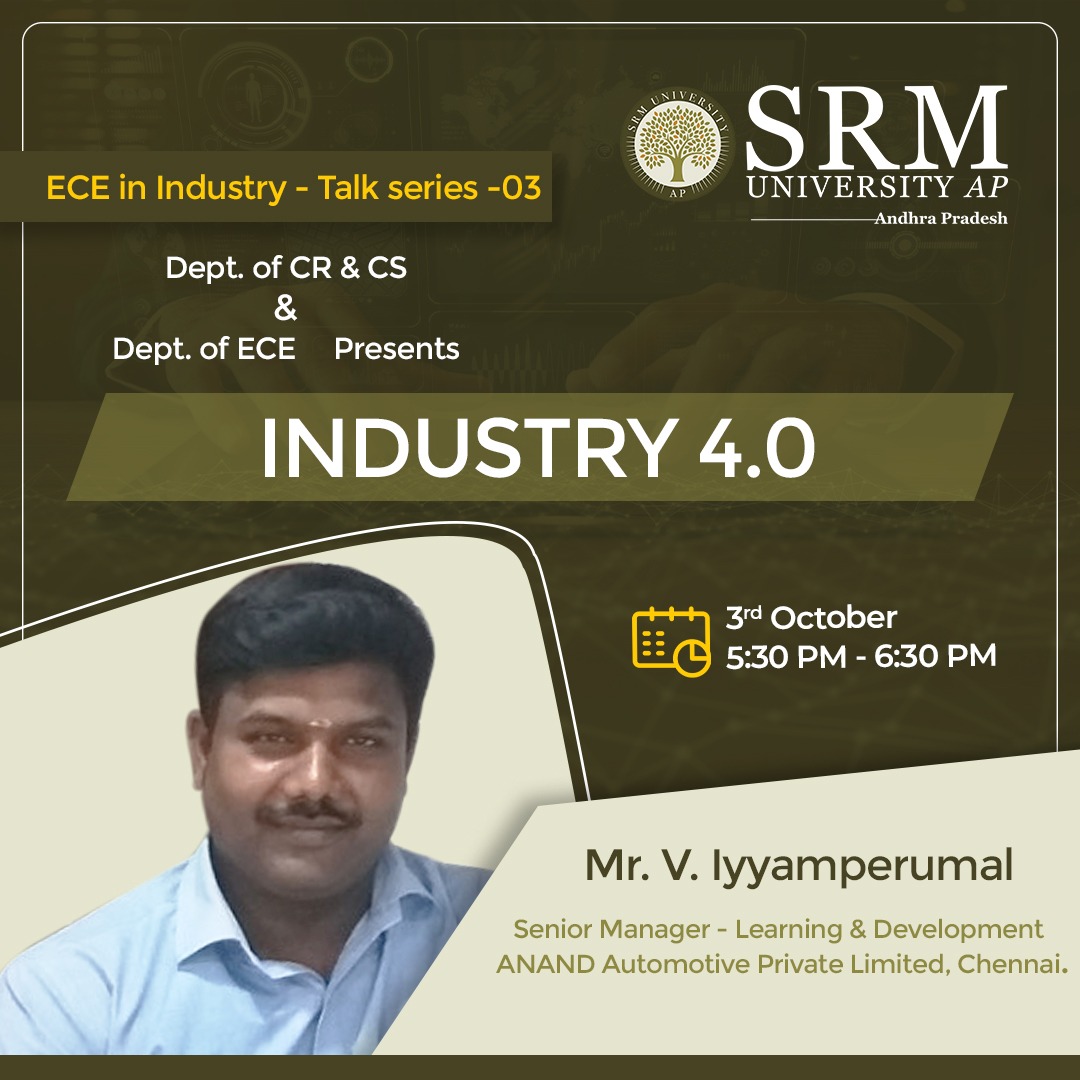 In the next chapter of the “ECE in Industry” talk series, Mr V Iyyamperumal will be joining the students to discuss the expectation of the future technology-driven industry. He will deliver a speech-“Industry 4.0” on October 3rd, 2020, at 5.30 pm.
In the next chapter of the “ECE in Industry” talk series, Mr V Iyyamperumal will be joining the students to discuss the expectation of the future technology-driven industry. He will deliver a speech-“Industry 4.0” on October 3rd, 2020, at 5.30 pm.
Mr V Iyyamperumal has more than seventeen years of experience as a learning and development professional. He has worked in various industries like Telecommunication, Electronics Manufacturing & Automobile Components Manufacturing Industry. Currently, he is working as a Senior Manager- Learning & Development at ANAND Automotive Private Limited, Chennai. He started his carrier as Technical trainer and has trained more than 75 thousand people ever since in various domain. The Six Sigma certified trainer is an expert in technical competency assessment, and very passionate about Learning and Networking.
ECE in Industry is one of a kind talk series organised by the Department of Electronics and Communication Engineering in collaboration with the Department of Corporate Relations & Career Services. The series comprises of lectures of eminent industry experts who will discuss the challenges and opportunities that an ECE student may find in the relevant industries. The talk series will provide a holistic idea to the students about the vast world of industries and its requirements.
To know more about the previous lecture,Please Click Here
- Published in CR&CS Events, CR&CS Webinars, ECE Events
72nd Outreach Programme of IIRS-ISRO on “Basics of Geocomputation and Geoweb Services”
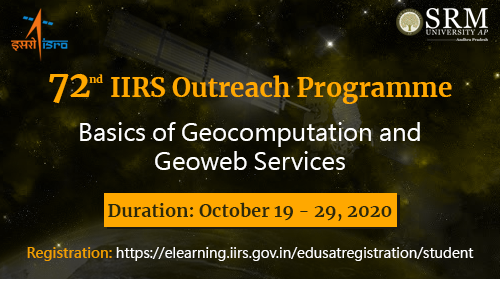 Indian Institute of Remote Sensing (IIRS) -Indian Space Research Organization (ISRO) presents 72nd outreach programme titled “Basics of Geocomputation and Geoweb Services”, which can be availed by the students of SRM University-AP, Andhra Pradesh.
Indian Institute of Remote Sensing (IIRS) -Indian Space Research Organization (ISRO) presents 72nd outreach programme titled “Basics of Geocomputation and Geoweb Services”, which can be availed by the students of SRM University-AP, Andhra Pradesh.
Geocomputation is an emerging field that uses computational techniques such as neural networks, heuristic search, and cellular automata, for spatial data analysis. It is evolving as an essential scientific realm that encompasses techniques of geographical information systems, neurocomputing, heuristic search and cellular automata.
Students of SRM AP are recommended to participate in this immensely beneficial programme from October 19, 2020 till October 29, 2020. During the programme, attendees will be introduced to Geocomputation – technology and applications, online GIS and geo-web services, open geodata repositories, and ISRO geoweb services for thematic applications, programming concepts for geo-computation, introduction to Python and R, and much more.
Programme Schedule: Please Click Here
Registration Link: Please Click Here
For further details, Visit Here
- Published in Departmental Events, ECE Events, Events
73rd Outreach Programme of IIRS-ISRO on “Overview of Geo-processing using Python”
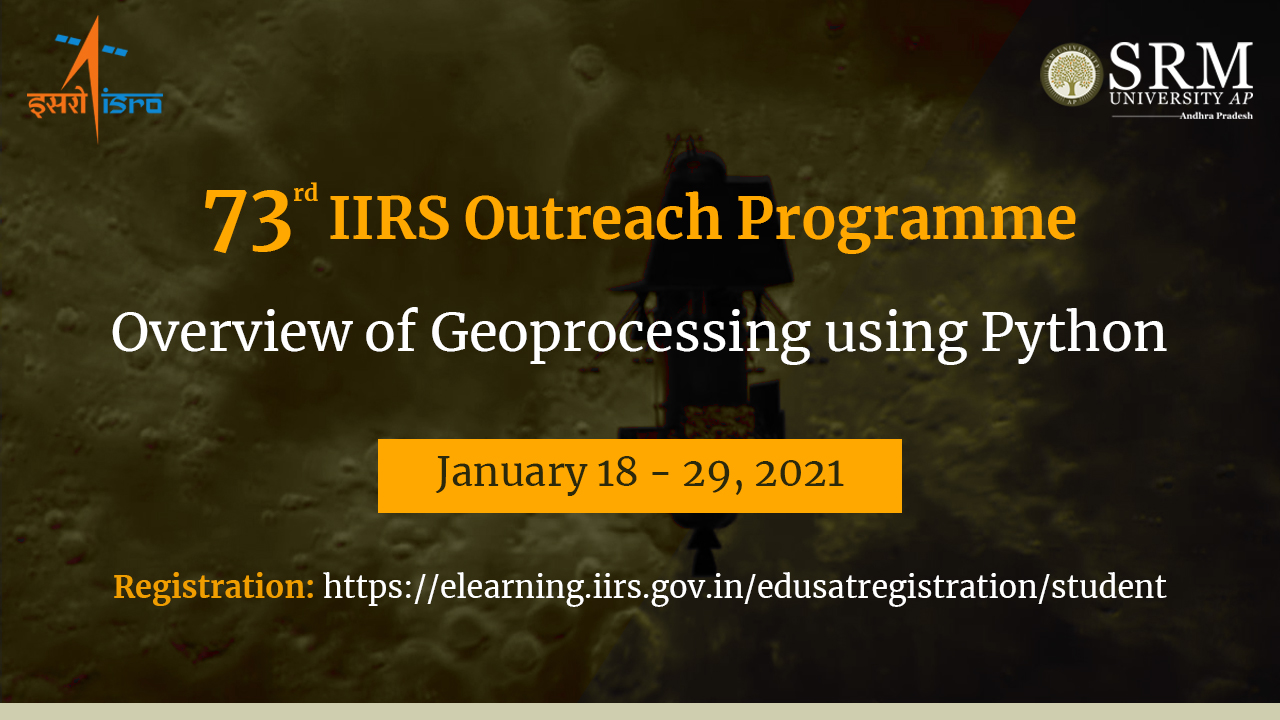 Students of SRM University AP, Andhra Pradesh get the opportunity to attend the 73rd outreach programme titled “Overview of Geo-processing using Python” arranged by Indian Institute of Remote Sensing (IIRS) -Indian Space Research Organization (ISRO). In the modern era, satellite imagery fused with the power of Geographic Information System enhances environmental management system by providing solutions pertaining to issues such as disasters, global climate change, natural resources, wildlife, and land cover. Effectively processing the massive data to decipher useful information is considered the most challenging aspect of geospatial technology. This programme encompassing a session from January 18, 2021 till January 29, 2021 will enable the participants to use Python to visualize geospatial data and derive the desired knowledge, mitigating the aforementioned challenge. Students of SRM AP are encouraged to attend this programme to broaden the prospect of achieving their career aspirations.
Students of SRM University AP, Andhra Pradesh get the opportunity to attend the 73rd outreach programme titled “Overview of Geo-processing using Python” arranged by Indian Institute of Remote Sensing (IIRS) -Indian Space Research Organization (ISRO). In the modern era, satellite imagery fused with the power of Geographic Information System enhances environmental management system by providing solutions pertaining to issues such as disasters, global climate change, natural resources, wildlife, and land cover. Effectively processing the massive data to decipher useful information is considered the most challenging aspect of geospatial technology. This programme encompassing a session from January 18, 2021 till January 29, 2021 will enable the participants to use Python to visualize geospatial data and derive the desired knowledge, mitigating the aforementioned challenge. Students of SRM AP are encouraged to attend this programme to broaden the prospect of achieving their career aspirations.
Programme Schedule: Please Click Here
Registration Link: Please Click Here
For further details, Visit Here
- Published in ECE Events, Events
73rd Outreach Programme of IIRS-ISRO on “Overview of Geo-processing using Python”
 Students of SRM University AP, Andhra Pradesh get the opportunity to attend the 73rd outreach programme titled “Overview of Geo-processing using Python” arranged by Indian Institute of Remote Sensing (IIRS) -Indian Space Research Organization (ISRO). In the modern era, satellite imagery fused with the power of Geographic Information System enhances environmental management system by providing solutions pertaining to issues such as disasters, global climate change, natural resources, wildlife, and land cover. Effectively processing the massive data to decipher useful information is considered the most challenging aspect of geospatial technology. This programme encompassing a session from January 18, 2021 till January 29, 2021 will enable the participants to use Python to visualize geospatial data and derive the desired knowledge, mitigating the aforementioned challenge. Students of SRM AP are encouraged to attend this programme to broaden the prospect of achieving their career aspirations.
Students of SRM University AP, Andhra Pradesh get the opportunity to attend the 73rd outreach programme titled “Overview of Geo-processing using Python” arranged by Indian Institute of Remote Sensing (IIRS) -Indian Space Research Organization (ISRO). In the modern era, satellite imagery fused with the power of Geographic Information System enhances environmental management system by providing solutions pertaining to issues such as disasters, global climate change, natural resources, wildlife, and land cover. Effectively processing the massive data to decipher useful information is considered the most challenging aspect of geospatial technology. This programme encompassing a session from January 18, 2021 till January 29, 2021 will enable the participants to use Python to visualize geospatial data and derive the desired knowledge, mitigating the aforementioned challenge. Students of SRM AP are encouraged to attend this programme to broaden the prospect of achieving their career aspirations.
Programme Schedule: Please Click Here
Registration Link: Please Click Here
For further details, Visit Here
- Published in ECE Events, Events
Crack exams with ease: lessons from the maestro
Department of Electronics and Communication Engineering organises Invited Talk to prepare students for the upcoming competitive exams
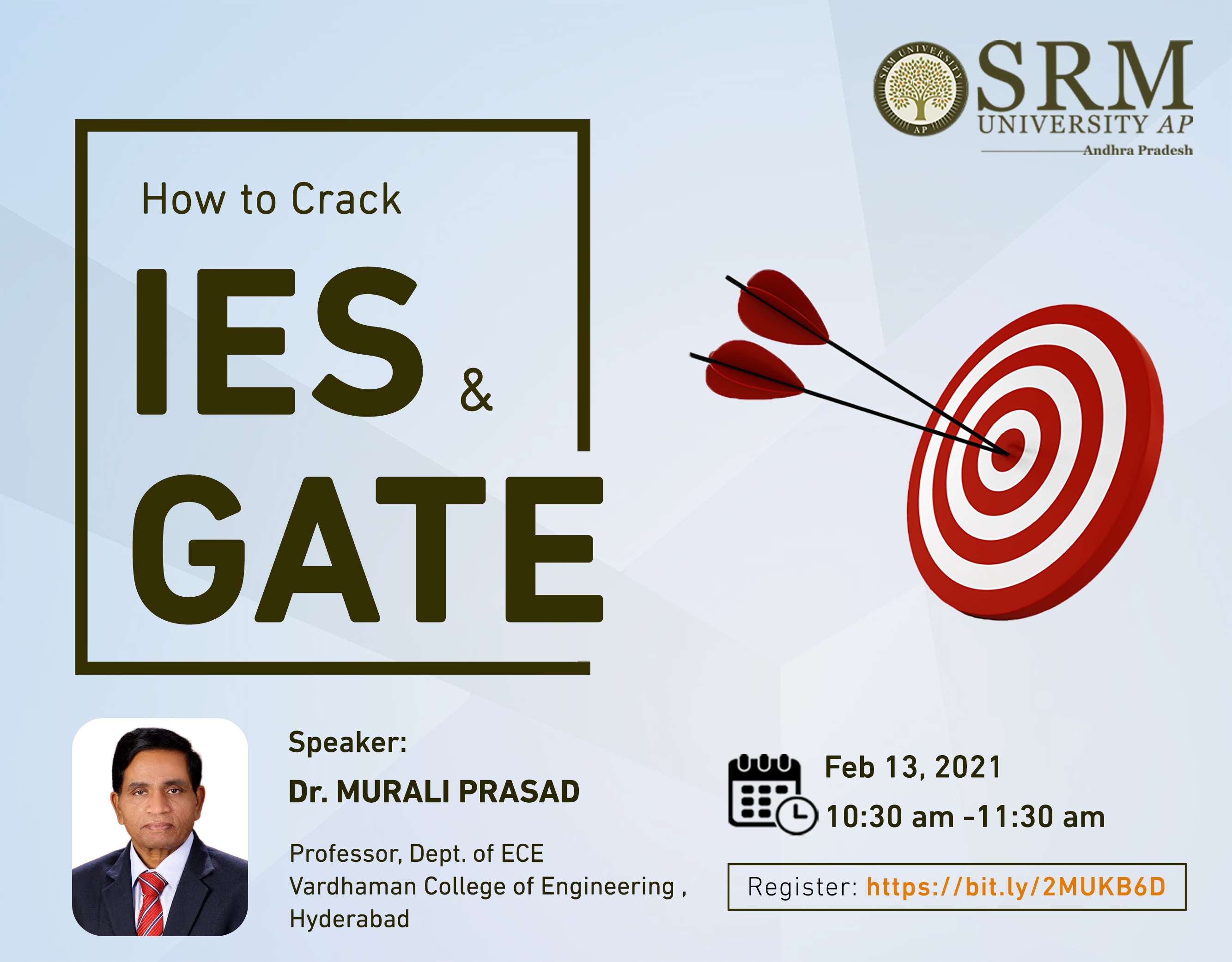 Higher Studies or Job? Students are often torn between these two after the completion of their undergraduate studies. Whereas getting a job after B.E./B.Tech is not that difficult, but securing one’s dream job may not be that easy. Some students prefer to take admission in a reputed institution and pursue higher studies, some might want to join R&D in well-established companies. A few might be even interested in securing employment in the public sector. The choices vary from one student to another depending on their merit, financial stability and personal preferences. SRM University-AP always encourages students to go for their choices. A good pay package is only useful when it comes with a job of one’s inclination. However, first of all, one has to be aware of the choices he/she has. Department of Electronics and Communication Engineering organises an invited talk on the two of the most sought after opportunities for engineers after their undergraduate studies- Indian engineering Services and GATE.
Higher Studies or Job? Students are often torn between these two after the completion of their undergraduate studies. Whereas getting a job after B.E./B.Tech is not that difficult, but securing one’s dream job may not be that easy. Some students prefer to take admission in a reputed institution and pursue higher studies, some might want to join R&D in well-established companies. A few might be even interested in securing employment in the public sector. The choices vary from one student to another depending on their merit, financial stability and personal preferences. SRM University-AP always encourages students to go for their choices. A good pay package is only useful when it comes with a job of one’s inclination. However, first of all, one has to be aware of the choices he/she has. Department of Electronics and Communication Engineering organises an invited talk on the two of the most sought after opportunities for engineers after their undergraduate studies- Indian engineering Services and GATE.
Indian Engineering Service offers highly prestigious employment under the Government of India. The IES is a very specialised and technical service. Only engineering graduates from recognised universities are eligible to take the entrance examination. Even postgraduates with specific specialisations such as wireless communications, radio engineering, electronics, or radiophysics are eligible to apply in certain posts. A career in Indian Engineering Services allows an engineer to administer a large segment of technical challenges in the public sector economy, consisting of Indian Railways, Power, Telecommunications, Central Water engineering, and Defence service of Engineers, Central Engineering Service.
On the other hand, the purpose of the GATE exam is to test students’ knowledge and understanding of their undergraduate level subjects in Engineering and Sciences. A misconception among the students is that the GATE exam is only necessary for the ME. /M. Tech aspirants who want to pursue a career in academia. But, the GATE score of the candidate is also valued by several public sector undertakings (PSU) for recruiting graduate engineers in entry-level positions or to be enlisted in the Fellowship Programs of CSIR or applying for scholarships in ME/M.Tech, and many more.
However, qualifying these examinations is not a piece of cake. It requires rigorous planning, perseverance and above all, hard work. But, there is always some strategic points which can make a student stand out in the exams. Dr Murali Prasad, the distinguished guest of the session, will brief you on some strategic points that will help you immensely in cracking the examinations. Dr Prasad has over 30 years of teaching experience, especially for competitive exams like GATE, IES in ACE Engineering Academy, Hyderabad. He has completed his graduation in engineering from The Institution of Engineers, Calcutta. He pursued his M tech from Pondicherry Engineering College and later obtained his PhD in WiMAX from JNTU Anantapur. Dr Prasad has published six patents and currently working as a Professor at Vardhaman College of Engineering, Hyderabad. Join the session tomorrow at 10.30 am and learn the masterstrokes from the expert to crack competitive exams like GATE and IES.
- Published in Departmental Events, ECE Events, Events, Invited Talks
A prospect of exploring Satellite based Navigation in the 74th IIRS-ISRO outreach programme
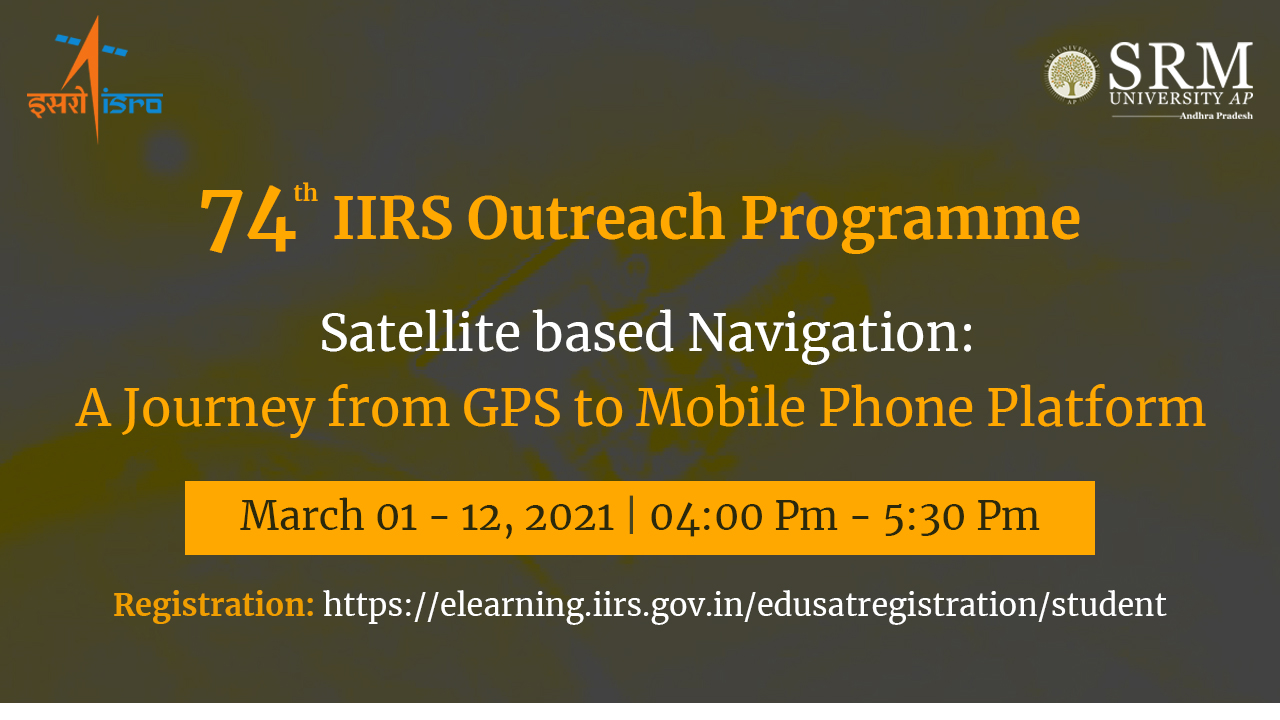 SRM University-AP, Andhra Pradesh has collaborated with the Indian Institute of Remote Sensing (IIRS) -Indian Space Research Organization (ISRO)’s outreach programme, enabling the students of SRM University-AP to avail the 74th IIRS outreach programme titled “Satellite based Navigation: A Journey from GPS to Mobile Phone Platform” sponsored by the Indian Space Research Organisation, Department of Space, Government of India. This programme is scheduled for March 1-12, 2021 and will be held from 4 PM till 5.30 PM.
SRM University-AP, Andhra Pradesh has collaborated with the Indian Institute of Remote Sensing (IIRS) -Indian Space Research Organization (ISRO)’s outreach programme, enabling the students of SRM University-AP to avail the 74th IIRS outreach programme titled “Satellite based Navigation: A Journey from GPS to Mobile Phone Platform” sponsored by the Indian Space Research Organisation, Department of Space, Government of India. This programme is scheduled for March 1-12, 2021 and will be held from 4 PM till 5.30 PM.
In the modern era, an enormous volume of geo-spatial data is acquired from various sources, which is further processed for various studies on earth’s resources. These geospatial datasets require secondary data in the form of geo-tagged samples, Ground Control Points (GCPs), and ground-based large scale maps, which can be acquired using Global Navigation Satellite System (GNSS) technology. Apart from its applications in precise positioning, GNSS has applications in various areas such as Total Electron Content (TEC) estimation, earthquake studies, atmospheric studies, and mobile Geographic Information System (GIS).
The 74th outreach programme is committed to impart the basic information about the GNSS, followed by the studies carried out in different related areas. At the end of this course, participants will be able to comprehend the use of GNSS receivers with different measurement and positioning techniques as per the application requirement.
Programme Details: Please Click Here
Programme Schedule: Please Click Here
Registration Link: Please Click Here
For further details, Visit Here
- Published in ECE Events, Events
Dr Ramana Vinjamuri to expose the fascinating tale of “Synergy Based Human Machine Interfaces”
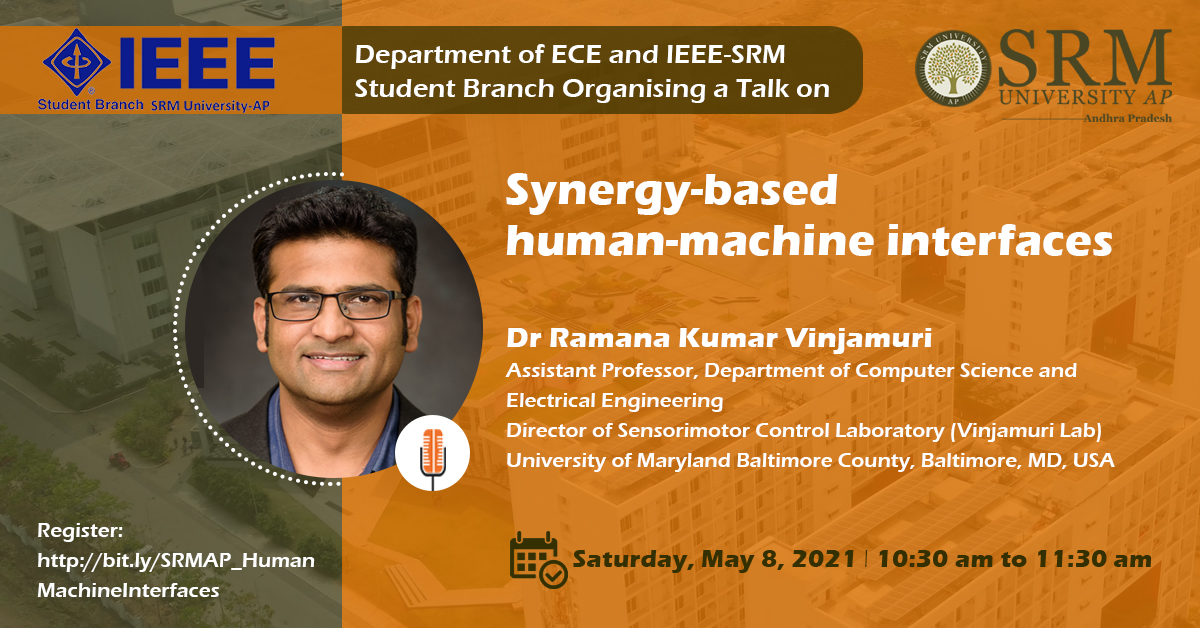 In collaboration with IEEE-SRM Student Branch, Department of Electronics and Communication Engineering, SRM University-AP, Andhra Pradesh, is organising a highly called for discussion on “Synergy Based Human Machine Interfaces”. The event has been scheduled for May 8, 2021, at 10:30 am. Dr Ramana Kumar Vinjamuri, Assistant Professor, Department of Computer Science and Electrical Engineering and Director of Sensorimotor Control Laboratory (Vinjamuri Lab), University of Maryland Baltimore County, Baltimore, MD, USA, will honour us with his presence as the keynote speaker.
In collaboration with IEEE-SRM Student Branch, Department of Electronics and Communication Engineering, SRM University-AP, Andhra Pradesh, is organising a highly called for discussion on “Synergy Based Human Machine Interfaces”. The event has been scheduled for May 8, 2021, at 10:30 am. Dr Ramana Kumar Vinjamuri, Assistant Professor, Department of Computer Science and Electrical Engineering and Director of Sensorimotor Control Laboratory (Vinjamuri Lab), University of Maryland Baltimore County, Baltimore, MD, USA, will honour us with his presence as the keynote speaker.
Human-machine interface (HMI) has not only become a popular technology but has become the hope of many individuals for restoring their lost limb function. Any HMI has two important intrinsic design components—(i) decode the human commands and (ii) controlling the machine to convert that command into action. Decades of research went into making the interface between the human and the machine seamless but was unable to effectively address the inherent challenges, namely, complexity, adaptability and variability.
To overcome the above challenges, it is critical to computationally understand and quantitatively characterise human sensorimotor control. Emerging areas in HMIs critically depend on the ability to build bioinspired models, experimentally validate them and utilise them in adaptive and intuitive control. The human hand with high dimensionality encompasses the three inherent challenges and may serve as an ideal validation paradigm. How central nervous system (CNS) controls this high dimensional human hand effortlessly is still an unsolved mystery.
To address this high dimensional control problem, many bioinspired motor control models have been proposed, one of which is based on synergies. According to this model, instead of controlling individual motor units, CNS simplifies the control using coordinated control of groups of motor units called synergies. However, there are several unanswered questions today— Where are synergies present in CNS? What is their role in motor control and motor learning? By combining the concepts of human motor control, computational neuroscience, machine learning and validation with noninvasive human experiments, can we answer these fundamental questions? The goal of this research is to develop efficient, seamless and near-natural human-machine interfaces based on biomimetically inspired models.
Dr Ramana Vinjamuri received his PhD in Electrical Engineering in 2008, specialised in dimensionality reduction in control and coordination of human hand from the University of Pittsburgh. He worked as a postdoctoral research associate (2008-2012) in the field of Brain-Machine Interfaces (BMI) to control prosthesis in the School of Medicine, the University of Pittsburgh, where he received Mary E Switzer Merit Fellowship from NIDILRR in 2010. Prior to that, he worked as a Research Assistant Professor in the Department of Biomedical Engineering at Johns Hopkins University (2012-2013) in the area of neuroprosthetics. He also served as an Assistant Professor in the Department of Biomedical Engineering at Stevens Institute of Technology (2013-2020). In 2018, he received Harvey N Davis Distinguished Teaching Award for excellence in undergraduate and graduate teaching. He earned the NSF CAREER Award in 2019 and NSF IUCRC Center Planning grant in 2020. His other notable research awards are from USISTEF and New Jersey Health Foundation. He holds a secondary appointment as an Adjunct Assistant Professor at the Indian Institute of Technology, Hyderabad, India. He is currently an Assistant Professor in the Department of Computer Science and Electrical Engineering at the University of Maryland Baltimore County.
- Published in Departmental Events, ECE Events, Events, Webinars
IIRS-ISRO offers “Online Certificate Course on Space Technology and Applications”
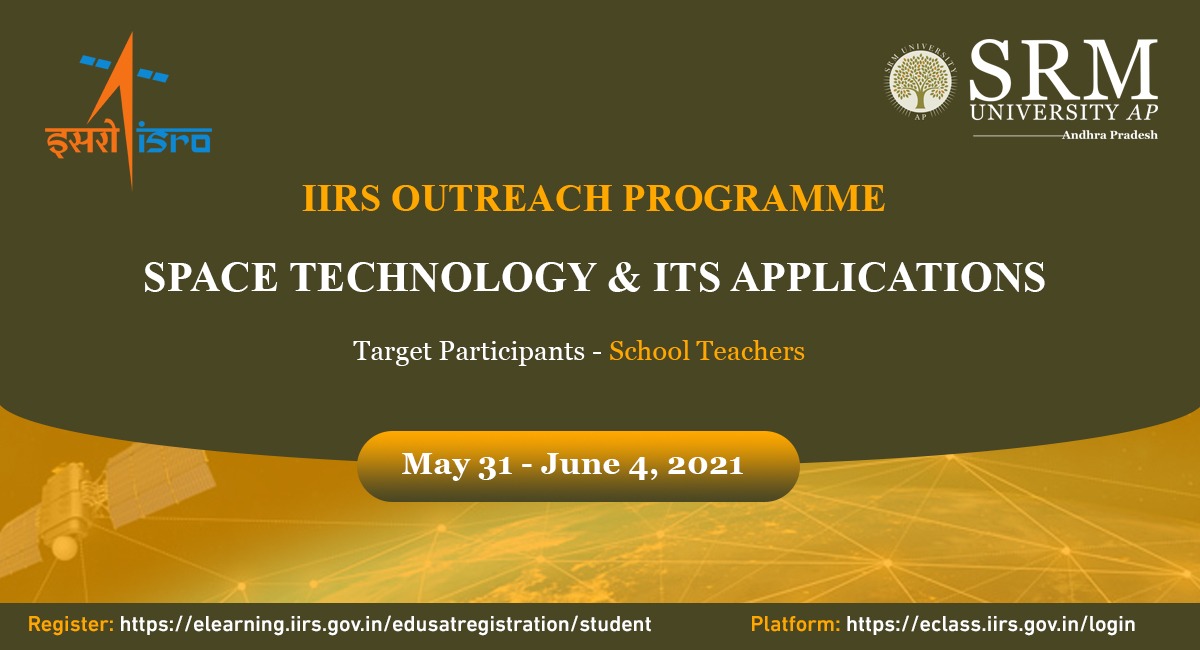 Indian Institute of Remote Sensing (IIRS) -Indian Space Research Organization(ISRO) is offering a five-day “Online Certificate Course on Space Technology and Applications” from May 31 to June 04, 2021. The course will be highly beneficial for the school teachers, who teach science, mathematics and geography. The Registration process is going on for the course. With a limited number of available seats, participants are encouraged to secure their enrolment as early as possible. The course intends to create awareness and capacity building of school teachers on the use of space technology and its application.
Indian Institute of Remote Sensing (IIRS) -Indian Space Research Organization(ISRO) is offering a five-day “Online Certificate Course on Space Technology and Applications” from May 31 to June 04, 2021. The course will be highly beneficial for the school teachers, who teach science, mathematics and geography. The Registration process is going on for the course. With a limited number of available seats, participants are encouraged to secure their enrolment as early as possible. The course intends to create awareness and capacity building of school teachers on the use of space technology and its application.
IIRS outreach programme is an innovative distance learning initiative for training the students and professionals from academic Institutions and user departments in the field of geospatial technology & Earth Observation (EO) by utilising state-of-art Information and communication technologies. SRM University AP-Andhra Pradesh has collaborated with the Indian Institute of Remote Sensing (IIRS) -Indian Space Research Organization (ISRO) ‘s outreach programmes. As part of the association, SRM University-AP being the nodal centre for such programmes, the people of SRM University-AP have the excellent opportunity to register for courses as well as live and interactive programmes being organised by IIRS. In addition, E-learning courses for a short span of 3-4 Month duration will be accessible by the students.
Course Brochure: Know more about the course
Course Schedule: View the detailed course schedule
Registration Link: https://elearning.iirs.gov.in/edusatregistration/student
Platform where course is held: https://eclass.iirs.gov.in/login
- Published in ECE Events, Events
Why Join ECE or EEE at SRM University AP
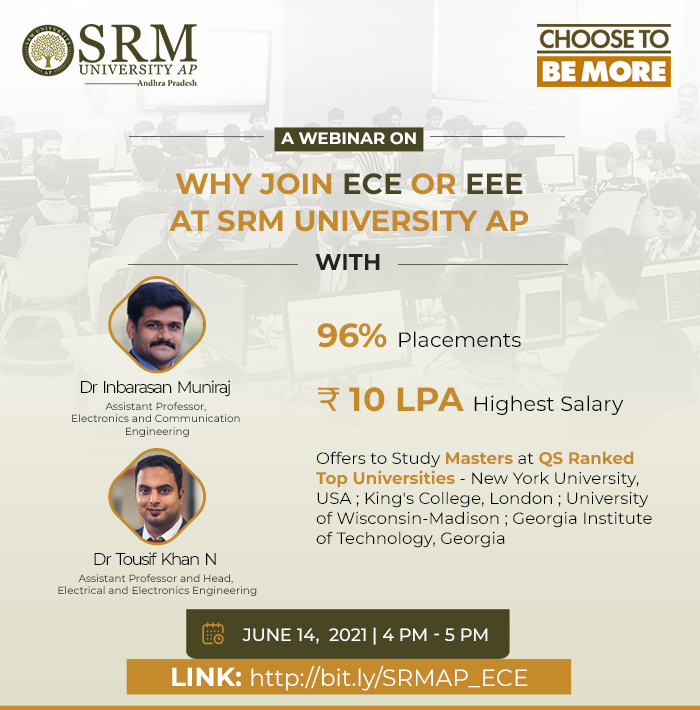 On June 14, 2021, at 4 pm the Department of ECE and EEE is hosting a webinar with the title “Why Join ECE or EEE Engineering at SRM, AP?” Experts discuss the perks associated with the BTech program, as well as the future opportunities at university. The Department of Electronics and Communication Engineering offers an Undergraduate program of B.Tech in Electronics and Communication Engineering with specializations of VLSI designs & Embedded Systems, Advanced Communication Systems, Image/Signal Processing using AI, whereas, the Department of Electrical and Electronics Engineering provides a B.Tech in Electrical and Electronics Engineering with an opportunity to participate in the Undergraduate Research Opportunities Program (UROP), Summer Internships, Specialized courses through the Study Abroad program, Senior Thesis Project, and Industry CO-OP through the semester.
On June 14, 2021, at 4 pm the Department of ECE and EEE is hosting a webinar with the title “Why Join ECE or EEE Engineering at SRM, AP?” Experts discuss the perks associated with the BTech program, as well as the future opportunities at university. The Department of Electronics and Communication Engineering offers an Undergraduate program of B.Tech in Electronics and Communication Engineering with specializations of VLSI designs & Embedded Systems, Advanced Communication Systems, Image/Signal Processing using AI, whereas, the Department of Electrical and Electronics Engineering provides a B.Tech in Electrical and Electronics Engineering with an opportunity to participate in the Undergraduate Research Opportunities Program (UROP), Summer Internships, Specialized courses through the Study Abroad program, Senior Thesis Project, and Industry CO-OP through the semester.
The leading branches with high-end career prospects are ECE and EEE Engineering. The departments established at SRM University, AP have well equipped labs and have ample resources for completing operations related to the subject matter. It works closely with the industry and prestigious foreign institutes. The faculty members of the departments are versatile in many diverse fields. They have good research potential and are committed teachers. The curriculum encourages students to work in research groups to undertake research projects, and outstanding students are often rewarded with seed money, patent support, research travel allowances, and benefits to complete the research. Students are sent to foreign universities under the Student Abroad program, where they spend a semester and come back with a rich experience. The program continually focuses on creating model students who can succeed in their chosen career path, contribute to their professional sector, and serve as role models for their community. Students will have a variety of job roles to play in the market/real world as electronic engineers and electrical engineers. Bidding adieu to the maiden B. Tech Batch, SRM University, AP is immensely proud to announce the successful placement of students with a total of 95 percent of students placed. Among the top placements, one student received a 29.5LPA package, and 71% of students received job offers in the dream and super dream categories. Apart from securing jobs in the government sector, they are employed by top manufacturing companies, Multinational Corporations (MNCs), and research-based or industrial corporations.
Register: http://bit.ly/SRMAP_ECE
- Published in Admission Events - Domestic, ECE Events, EEE, Events
Does ECE Branch Provides more opportunities than CSE?
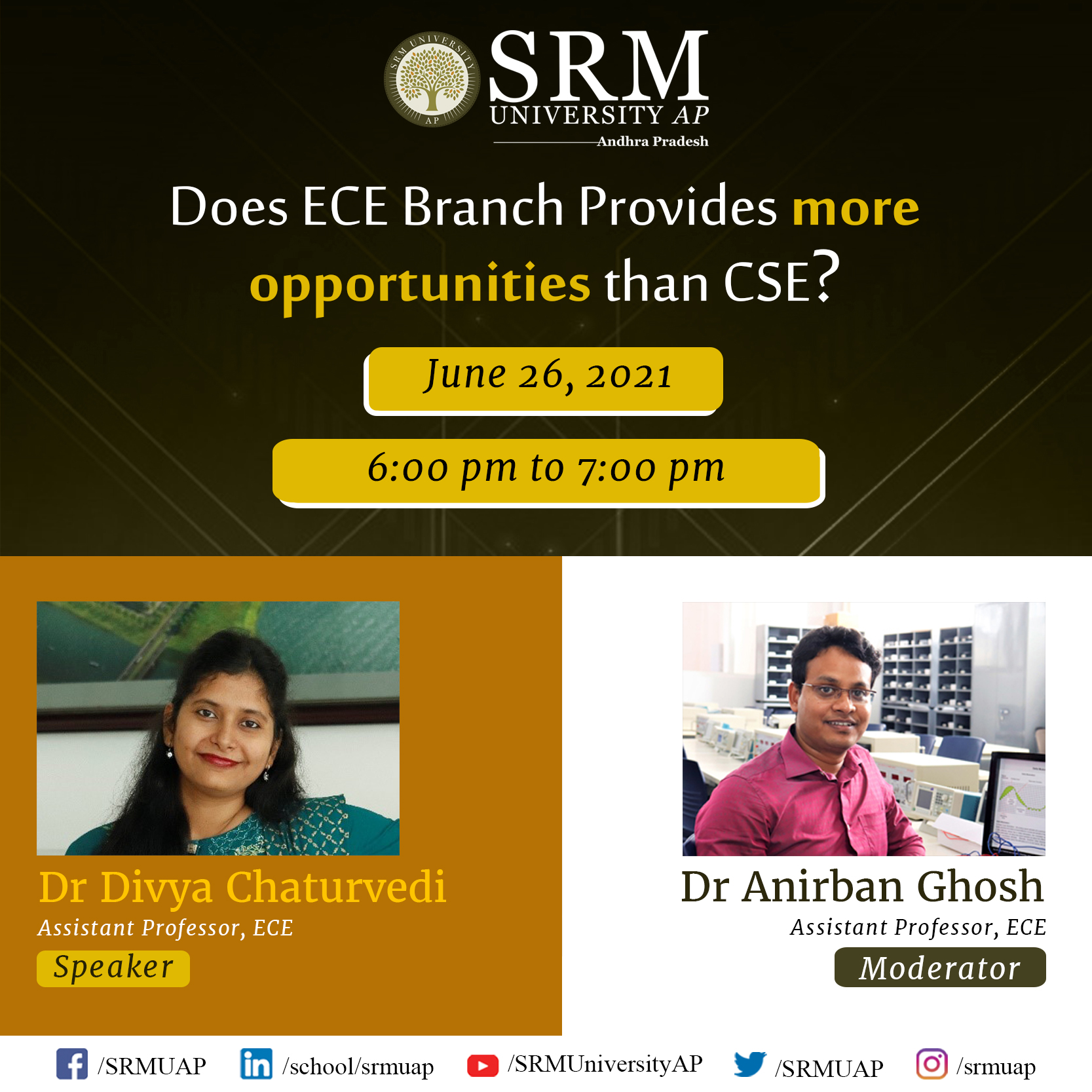 Electronics and Communication Engineering (ECE) is an all-rounder branch of engineering that does not limit only to IT jobs but provides career opportunities in both government and private sectors (Core and Non-core). SRM University-AP, Andhra Pradesh invites ECE aspirants to join a live webinar on “Does ECE Branch Provides more opportunities than CSE” followed by a panel discussion on “Job Opportunities with ECE” on June 26, 2021, at 6.00 pm. The main speaker of the webinar Dr Divya Chaturvedi and the moderator of the panel discussion Dr Anirban Ghosh, assistant professors from the Department of ECE, will clarify the doubts and incertitudes of students regarding the course during the session.
Electronics and Communication Engineering (ECE) is an all-rounder branch of engineering that does not limit only to IT jobs but provides career opportunities in both government and private sectors (Core and Non-core). SRM University-AP, Andhra Pradesh invites ECE aspirants to join a live webinar on “Does ECE Branch Provides more opportunities than CSE” followed by a panel discussion on “Job Opportunities with ECE” on June 26, 2021, at 6.00 pm. The main speaker of the webinar Dr Divya Chaturvedi and the moderator of the panel discussion Dr Anirban Ghosh, assistant professors from the Department of ECE, will clarify the doubts and incertitudes of students regarding the course during the session.
ECE branch offers combined courses in both hardware and software fields leading to more job opportunities in the private as well as government sector. In addition, the Technology Business Incubator established in our university support the students to launch their own start-up ventures. After clearing technical exams conducted by UPSC [IAS/IES] and PSUs [defence, railway, intelligence agency] ECE graduates can secure higher rank jobs in the government sector. ECE is one of the four branches [Civil/EEE/MECH/ECE] eligible to write the IES exam.
To know more about the matchless job opportunities that the ECE course at SRM University-AP can help you grab, join this interactive live panel discussion on June 26, 2021, at 6.00 pm.
Learn More:https://srmap.edu.in/seas/electronics-and-communication-engineering/scope-opportunity/
Register here:https://srmap.zoom.us/webinar/register/WN_ZWOKS52DSSyuaA6Pvm2ASA
- Published in Admission Events - Domestic, ECE Events, Events

